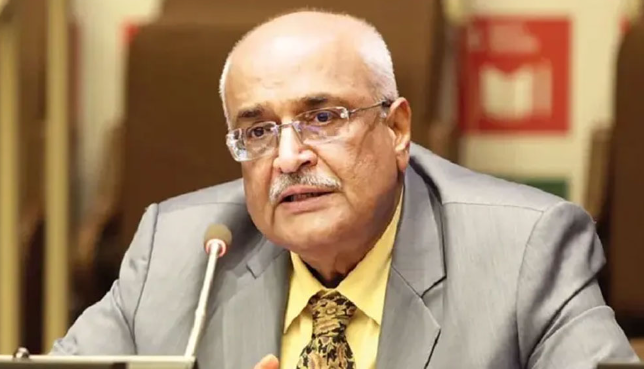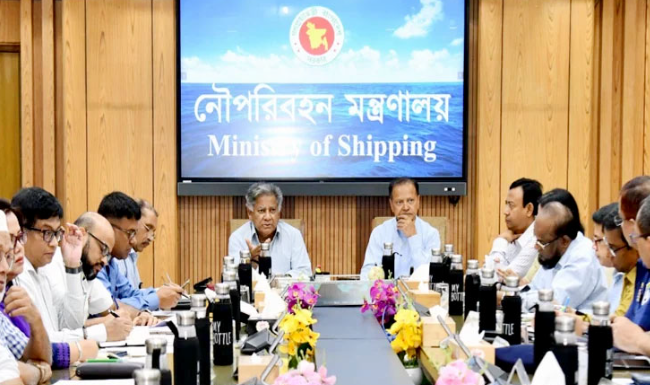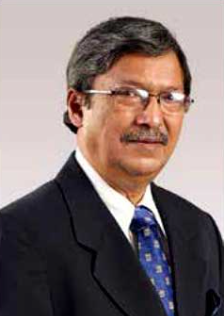DeskReport
Dr. Debapriya Bhattacharya, Honorary Fellow of the Dhaka-based think tank Center for Policy Dialogue (CPD), said, “There is nothing to fear as much as we are afraid of the US tariffs. Because, in the trade economy, there is no such thing as the ultimate enemy.” He said this at a seminar titled ‘US Reciprocal Tariffs and Bangladesh’s Action Plan’ organized by the Dhaka Chamber of Commerce and Industry (DCCI) on Saturday.
Dr. Debapriya presented the keynote address at the seminar held at the DCCI Auditorium. At that time, he said, “Meanwhile, negotiations have begun between China and the United States. If tariffs are imposed on us, it will also be a loss for them. The import costs of their products will increase. Because, the teeth of the tariffs will also fall on them. Therefore, the impact of the tariffs on us is not comparable.”
Dr. Debapriya Bhattacharya has been elected as a member of the UN Committee for Development (CDP) for the third consecutive time. File photo
Dr. Debapriya Bhattacharya has been elected as a member of the UN Committee for Development (CDP) for the third consecutive time. File photo
Dr. Debapriya Bhattacharya, Honorary Fellow of the Dhaka-based think tank Center for Policy Dialogue (CPD), said, “There is nothing to fear as much as we are afraid of the US tariffs. Because, there is no such thing as the ultimate enemy in the trade economy.” He said this at a seminar titled ‘US Reciprocal Tariffs and Bangladesh’s Action Plan’ organized by the Dhaka Chamber of Commerce and Industry (DCCI) on Saturday.
Dr. Debapriya presented the keynote address at the seminar held at the DCCI Auditorium. At that time, he said, ‘Agreement has already started between China and the US. If we impose tariffs, it will also be a loss for them. The import cost of their products will increase. Because, the teeth of the tariffs will also fall on them. So the impact of the tariffs on us is not coming in a comparative way.’
At that time, Dr. Debapriya also commented that there should be no confusion about the LDC (List of Development Countries) graduation. He said, ‘We have two years. We have to see whether we have been able to use this time properly. We cannot deal with these tariffs only through trade policy, we have to go for product diversification. We have to think from the point of view of our strengths. We have to focus more on the service sector than on products.’
He said, ‘Our government’s initial reaction to the US tariffs was right. We don’t need to shake our hands and legs.’ He called on the private/private sector to come forward more in the government’s reform work.
At the meeting, International Chamber of Commerce (ICC) President Mahbubur Rahman said, ‘Our negotiation skills are low. We need to further improve our negotiation skills.’ Policy Exchange of Bangladesh Chairman Dr. Masrur Riaz said, ‘When two elephants fight, the grass below is crushed (Dalit-Mathit). Again, even when they play, the grass is crushed. Therefore, we have to proceed very carefully in this war between China and the US.’
Commerce Secretary Mahbubur Rahman was present as the chief guest at the seminar. He highlighted various steps including building a warehouse for cotton to deal with the US tariff.
At the meeting, BTMA Director Rajib Haider said, ‘After every disaster, an opportunity comes. But only those who survive get that opportunity. We businessmen will not survive the gas disaster that has started. Gas meters are going down every day. Our production has decreased by 40 percent. So, there is no point in discussing our opportunities.’
He demanded a discussion at the policy-making level to quickly resolve the gas problem.
Dr. Debapriya also commented that there should be no confusion about the LDC (Least Developed Countries) graduation. He said, “We have two years. We have to see whether we have been able to use this time properly or not. We cannot deal with these tariffs only through trade policy, we have to go for product diversification. We have to think from the point of view of our strengths. We have to focus more on the service sector than on products.”




